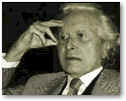![]()
The Sad Loss of Lord Bauer
![]()
Old Hickory
 I was going to respond to The
Economist’s piece on Lord Bauer before I heard the sad news of his
death, on Thursday 2 May 2002. He
was born on 6 November 1915. If
there is a chance to write about Bauer, I usually take it.
His books have been a great boon.
The occasion of The Economist
piece was related to the Friedman prize valued at $500,000 (£342,500), due to
be awarded exactly a week later than his death.
The Economist article was way
kinder to Bauer than the rather hostile book reviews of the1980s that said he
was largely repeating his old ideas and that they were not particularly true
anyway. This week’s article
admits that Bauer was basically right about markets when it was not
fashionable to say so in the 1950s and 1960s.
It holds that Bauer was to the idea of the Third World as Hayek was to
the USSR, or to socialism (p93). The
piece is well titled as A Voice for the
Poor. He correctly saw that
the free market made the poor way better off.
I was going to respond to The
Economist’s piece on Lord Bauer before I heard the sad news of his
death, on Thursday 2 May 2002. He
was born on 6 November 1915. If
there is a chance to write about Bauer, I usually take it.
His books have been a great boon.
The occasion of The Economist
piece was related to the Friedman prize valued at $500,000 (£342,500), due to
be awarded exactly a week later than his death.
The Economist article was way
kinder to Bauer than the rather hostile book reviews of the1980s that said he
was largely repeating his old ideas and that they were not particularly true
anyway. This week’s article
admits that Bauer was basically right about markets when it was not
fashionable to say so in the 1950s and 1960s.
It holds that Bauer was to the idea of the Third World as Hayek was to
the USSR, or to socialism (p93). The
piece is well titled as A Voice for the
Poor. He correctly saw that
the free market made the poor way better off.
On Friday night, Ed Crane,
president and co-founder of the Cato
Institute, got it right when he said: “The world has lost a great
man”. His books against the
tide were great in their affect on many, such as Bill Warren who wrote a handy
book on Imperialism in 1980 on the spadework of Peter Bauer. Crane added, “Peter Bauer was one of the most courageous
advocates of liberty I have ever known. While
this is a great loss I am so pleased that Peter lived to learn he had won the
prize. It is recognition at the
highest level of his life’s work.” The
dinner to award the prize was due on Thursday 9 May 2002.
John Blundell, the director of the Institute
of Economic Affairs[IEA], will now be at the dinner instead of Bauer.
The prize money will go to Lord Bauer’s estate.
Milton Friedman, the Nobel prize-wining economist after whom the prize
is named, will still be there.
Bauer was against corruption.
I once wrote to him to ask if he had published anything of late in
magazines that I could cite in a University essay as they now considered his
books as old. He replied saying
that my concern with up-to date citations was corrupt if the ideas in them
were still germane. But his book The Development Frontier (1991) just happened to be hot off the
press. I duly got it and was able
to impress the lecturers with an up-to-date book.
However, it still seems to be the
case that most students think that there is some form of exploitation where
the lands that are rich today got so by making other lands poor.
They still think in zero-sum terms that has it that arithmetic applies
to all things and the positive sum game is alien to their outlook.
If some are in poverty then it is owing to others being better off.
That may be true ipso facto
but it is not germane. Non-economists,
like Peter Singer, have held that not only is aid a duty but that equal shares
are also a duty so that most of what we earn should go in aid.
[“Famine, Affluence, and Morality” in World
Hunger and Moral Obligation (1977) p22ff].
The affect of this on students is to extend their feelings of guilt, a
result that Bauer was out to counter. Reinforced
dogmatism on the part of the guilty makes this something of an uphill task.
Students have long been quite determined to see the market as harsh in
some way and bigotry on the topic has been thought to be the correct response.
We should show we are kind by supporting state aid rather than by
giving to charity, which would truly be to put our money where our mouth was.
However, Bauer showed that state aid was not so much aid to the poor
as aid to killer states that often sought to cut a supposed population problem
by killing off some of the people within their domain.
To aid the state in many lands was to aid an anti-social institution
and if it was by taxation, then it was cheap words rather than actual aid in
any case.

The heroes of the left in Africa,
like Julius Nyerere of Tanzania, get a very different write up in Bauer’s
books to what one might expect. Students
liked Nyerere as he echoed their own zero-sum outlook thus “If the rich
nations go on getting richer and richer at the expense of the poor, the poor
of the world must demand a change..” [Equality, the Third World and Economic Delusion(1981) p69] but the
reality was that the West built up the land that Nyerere ruled over.
The basic point was lost a bit in the Monty Python film Life
of Brian but still largely put over in the What
have the Romans done for us? sketch.
The most developed of the poorer countries are those that have the most
interaction with rich countries, through trade and the exchange of ideas.
And aid given to the likes of Nyerere ended up in being used for his many political executions (p95). He also forced mass migration, and confiscation that impaired food production rather than stimulating it (p106). Why was all this overlooked? It was owing to guilt and the fact that Nyerere opposed the West that the students had too come to hate, haply owing to their guilt. In any case, even if the money was used with more care, it took more than just money to develop a country. People had to develop the institutions from the bottom up and the state was bound to be remote from this development.
The Economist
article has Bauer as next only to Hayek and Friedman as champions of the free
market. Bauer was born in
Budapest in 1915 and arrived in the UK in 1934 to study and later teach at
Cambridge, and then at the LSE. Mrs
Thatcher got him into the Lords in 1982 but he is reported as not wanting to
do much there. He did
occasionally make a speech that was worth listening to on Today
In Parliament. Bauer
characteristically flattened the argument of the vicious circle with the
question of “how did any land ever get rich then?”
If the market were allowed to develop it would aid progress.
If the vicious-circle theory were true, we would all still be living in
the Stone Age, or rather, a few of us would.
The only equality that Bauer had time for was equality before the law.
He rightly saw that economic development on the market tended to make
the luxuries of today the household goods of tomorrow, even if a few fresh
luxuries emerged to give the very rich a temporary access to things the masses
might not have for a few years. He
was for limited government little or no inflation and a night watchman state.
Foreign “aid” maintained the
Third World rather than helped it to find its feet. “Aid” was “an excellent method for transferring money
from poor people in rich countries to rich people in poor countries.”
Bauer did not like the expression and was fond of pointing out that the
lands so described were by no means uniform, but very diverse.
A few years ago, many Libertarian Alliance members were present at a
talk he gave to the IEA. He
characteristically welcomed all questions, the more critical the better.
He was a bit physically weak so he needed to sit down but his brain
remained lively. He was on fine
form that night and he gave some stimulating answers to the questions.
That is how I will remember the author as I often re-read his many
books.
OLD HICKORY

![]() The advocacy of redistribution clearly implies
a basic similarity of requirements between those affected by it.
But on a global level there is not even the semblance of such a
similarity. People in the
Caribbean area require fewer clothes and less fuel than people in Canada.
Hence international comparisons of conventionally measured incomes are
abstract to the point of being meaningless.
The advocacy of redistribution clearly implies
a basic similarity of requirements between those affected by it.
But on a global level there is not even the semblance of such a
similarity. People in the
Caribbean area require fewer clothes and less fuel than people in Canada.
Hence international comparisons of conventionally measured incomes are
abstract to the point of being meaningless.
![]() P.T. BAUER
P.T. BAUER
![]()
Further reading:
"it ought to be read carefully by those of both the nominal Right
and the nominal Left who profess to base their desire to promote development
on a concern for the humanity and dignity of man." Harry G. Johnson
in Encounter
:
Professor Bauer argues that many of the staples of economic debate and policy are demonstrably invalid.
![]()
Bauer was against corruption.
I once wrote to him to ask if he had published anything of late in
magazines that I could cite in a University essay as they now considered his
books as old. He replied saying
that my concern with up-to date citations was corrupt if the ideas in them
were still germane. But his book The Development Frontier (1991) just happened to be hot off the
press. I duly got it and was able
to impress the lecturers with an up-to-date book.
![]()
![]()
However, Bauer showed that state aid was not so much aid to the poor
as aid to killer states that often sought to cut a supposed population problem
by killing off some of the people within their domain. To aid the state in many lands was to aid an anti-social institution
and if it was by taxation, then it was cheap words rather than actual aid in
any case.
![]()
![]()
And aid given to the likes of Nyerere ended up in
being used for his many political executions (p95). He also forced mass migration, and confiscation that impaired food
production rather than stimulating it (p106). Why was all this overlooked?
It
was owing to guilt and the fact that Nyerere opposed the West that the
students had too come to hate, haply owing to their guilt.
![]()